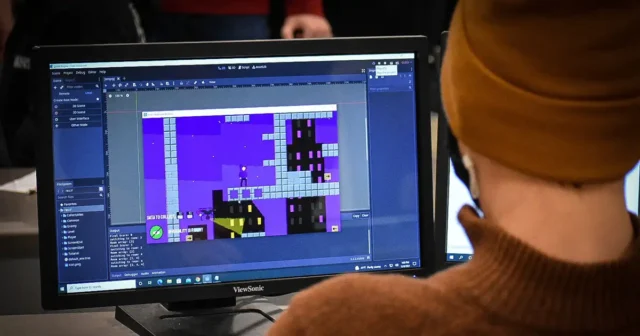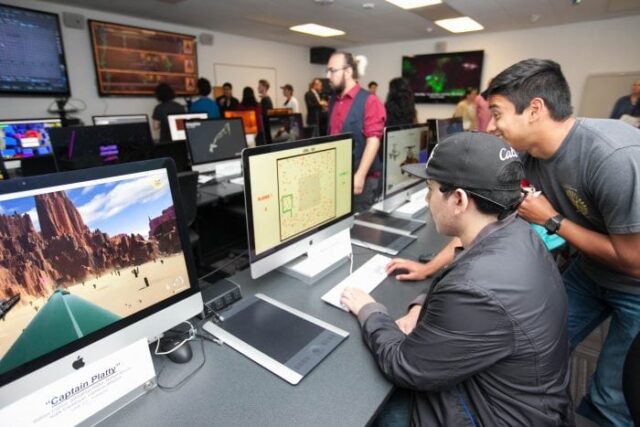
As people have come to accept that games are here to stay, interest in game design has skyrocketed. This multibillion-dollar market is not going anywhere.
This prosperity does not translate into consistently rapid job expansion within the sector but rather into an increase on par with the national average.
A steadily increasing number of universities provide programs specifically for this industry. Higher education offerings are springing up like daisies in classrooms across the country.
That’s great news because you can pick from various game design programs. As a result, it implies that rivalry is intensifying.
Enhancing Your Study of Game Design
You may distinguish yourself from the crowd by taking these steps. If you want to stand out from the crowd, one method is to devote effort to designing your games.
One way to get ahead in the game design field is to immerse oneself in it by reading, writing, and attending industry events.
An excellent method to show that you’re not like others is to try your hand at game design.
You’ll get better at it if you put in more time practicing. I urge you to proceed. Make your games.
Make game scripts or storyboards instead of learning to code. Create the game’s rules and format (cards, board, etc.).
By implementing a couple of these strategies, you may set yourself apart from your less driven classmates.
Another option is available. And the first step toward that goal is completing formal education. Even if your degree is in game design, you may need more to get hired in today’s tight job market.

Having examples of your previous work will impress potential employers more than any degree or certification you may have.
The ability to construct a diverse portfolio is something to look for in a top university. The best majors and degree programs can only be chosen with this information.
We’ve compiled information about five different degrees so you can find the one that’s the best fit for your goals and passions.
We have also gone to the trouble of naming some schools that provide the course of study.
Five Design Majors for the Video-Gaming Niche
Here are five design majors for the video-gaming niche.
BS in Computer Science
An education in computer science provides a solid groundwork for a career in software development. The education you receive in a degree program for game design may be helpful, but it may also restrict your creativity.
A computer science degree, even with a gaming emphasis, will give you a more extensive range of transferable abilities.
You can take a broad, superficial, or more targeted and in-depth approach.
It is helpful to have a broad range of abilities for computer science degrees from an engineering and a programming perspective.
According to the Princeton Review, Utah University is the best institution in the US to earn a degree in game design. Their approach to designing video games is primarily based on computer science.
To declare a computer science major in their Entertainment Arts and Engineering program, you must get a C- or better in several required courses. It’s an essential first step toward achieving your goals successfully.
BA in Interactive Entertainment

The curriculum for this degree extends beyond the realm of “video games” as we know them today (console and pc based).
Due to the “interactive media” label, it is assumed that they will investigate new media and technology.
There are benefits to earning a BA in Interactive Entertainment.
Being ahead of the curve in terms of innovative approaches to communicating with customers is a terrific way to stand out. Teamwork and cooperation are also emphasized throughout the study.
This is a must-have for any career working with game developers. It also pays considerable emphasis to another critical trait, creative leadership.
BS in Game Design and Development
The breadth of knowledge gained in a Bachelor of Science in Game Design and Development program, including computer science fundamentals, makes it a valuable degree.
If you don’t get your dream career in game design, having a solid computing background will provide you with options. Your choices will extend to adjacent industries like education and gaming.
As the number of schools providing game design degrees rises, the pool of qualified applicants grows less.
Your job search will be smooth if you graduate with a degree in game design and possess strong, horizontally transferrable talents.
The curriculum at Rochester Institute of Technology is comprehensive and allows for extensive elective concentration.
Take some classes in game design for mobile devices and the web, or get in headfirst with game development and an engine.

RIT’s curriculum is unique because all students must participate in a co-op.
During your stay there, you will be able to add to your impressive portfolio and be expected to work full-time for pay.
BA in Game Design
While a background in mathematics is helpful, a BA in Game Design places greater emphasis on creative disciplines.
You won’t be learning the ins and outs of technical coding but rather subjects like economics and psychology.
Putting the user first is what this entails.
You can learn the skills necessary to create in-game interfaces and other features by earning a Bachelor of Arts in Game Design from an accredited university, such as Digipen Institute of Technology.
That isn’t all it’ll accomplish, though. You’ll learn to analyze user interactions in contexts beyond video games.
You’ll have the skills necessary to create any interface for any piece of software.
If you’re particularly interested in the creative side of game development, consider pursuing a BA in game design.
A bachelor’s degree in game design is an attractive choice if you aren’t particularly interested in or good at programming or mathematics.
You will still have to cope with some programming courses and lighter weights of mathematcs.
Bachelor of Fine Arts in Game Design

The distribution of coursework for a fine arts degree varies from that of an art degree. Two-thirds of a BA curriculum should consist of general liberal arts classes, while one-third should focus on a particular area of the liberal arts.
The credit-to-debt ratio is flipped for those with a BA in the arts. Roughly two-thirds of your time will be immersed in your chosen field of expertise, game design.
New York University’s Tisch School of the Arts offers a Bachelor of Fine Arts in Game Design that prepares students for various careers in the gaming industry.
All sorts of gaming-related careers, from game designer to game critic, can be explored through their various courses.
In-depth financial analysis of the video game industry is the focus of several game business courses. Those specializing in audio or visual design can cater to the two primary senses that players employ to take in and process video games.
You can learn to cover games like a reporter by enrolling in a game studies program. You may even try your hand at writing critiques and reviews of video games.
Conclusion
There you go! Those mentioned above are the five video game design majors you can get into if you should study courses specializing in the video gaming niche.
Who knows! Maybe sooner or later, you can design a huge project video game that can be added to well-known video gaming sites or casino gaming sites listed by Casino reviewers.








